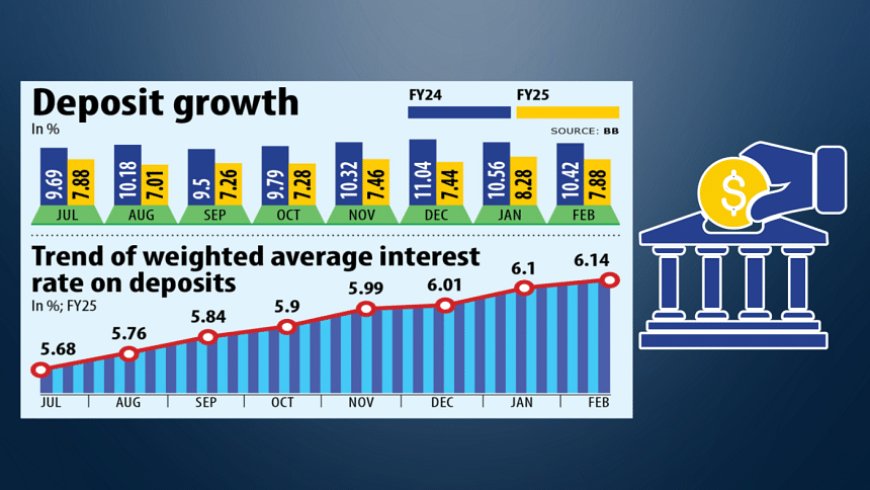Banks Witness Slow Deposit Growth Amid Inflation Pressure on Savers
Banks Witness Slow Deposit Growth Amid Inflation Pressure on Savers

High Inflation, Economic Slowdown, and Political Uncertainty Weigh on Bank Deposits
Banks have experienced sluggish deposit growth throughout the current fiscal year, as persistently high inflation and a slowing economy have constrained people's ability to save—despite rising interest rates. Several bankers noted that diminished private sector loan demand, growing political uncertainties, and a shift by affluent individuals toward treasury bills and bonds have further hampered deposit accumulation.
According to Bangladesh Bank data, total bank deposits stood at Tk 17.93 lakh crore at the end of February, marking a year-on-year increase of 7.88 percent. However, this growth was lower than the 10.42 percent recorded in February 2024. The average deposit growth during the first eight months of FY 2024–25 stood at 7.68 percent, compared to 10.28 percent in the same period a year earlier.
While the weighted average interest rate on deposits rose to 6.14 percent in February—more than one percentage point higher than the previous year—savings have not kept pace due to inflationary pressures. “High inflation means people are spending more to buy the same goods, which reduces their capacity to save,” said Syed Mahbubur Rahman, Managing Director and CEO of Mutual Trust Bank (MTB) PLC. Official figures show that consumer inflation stood at 9.17 percent in April, slightly down from 9.35 percent in March, but still above the 9 percent mark for over two consecutive years.
Bangladesh’s economic growth has also slowed sharply, registering just 4.22 percent in FY 2023–24—its lowest since the pandemic. The World Bank has revised its forecast further downward to 3.3 percent for the current fiscal year, the weakest in decades.
Rahman also pointed out that falling imports of capital machinery reflect declining investment demand. Additionally, many savers have diverted their funds to treasury instruments and US dollars, capitalizing on higher yields and the depreciating taka.
A senior BRAC Bank official attributed part of the deposit slowdown to the contractionary monetary policy pursued by the central bank. Another treasury head at a private bank explained that deposit inflows typically rise when credit demand is strong—something currently lacking. In February, private sector credit growth stood at only 6.82 percent year-on-year, the lowest in 18 years.
“The modest deposit growth we're seeing is largely due to salary disbursements and limited private credit distribution,” the official said, adding that most banks are now parking funds in government securities due to the lack of viable lending opportunities.
He also pointed to political uncertainty affecting business sentiment. “Firms previously aligned with the Awami League government are less active now. Private sector investment interest remains subdued, and we expect clarity only after the election schedule is announced.”
What's Your Reaction?



















































































